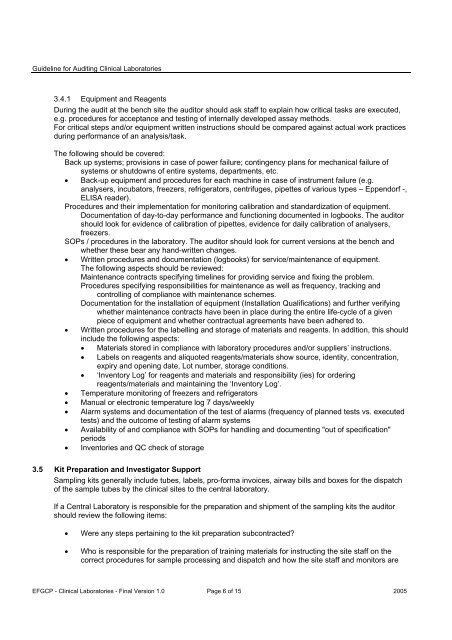EFGCP Guideline for Auditing Clinical Laboratories - European ...
EFGCP Guideline for Auditing Clinical Laboratories - European ...
EFGCP Guideline for Auditing Clinical Laboratories - European ...
You also want an ePaper? Increase the reach of your titles
YUMPU automatically turns print PDFs into web optimized ePapers that Google loves.
<strong>Guideline</strong> <strong>for</strong> <strong>Auditing</strong> <strong>Clinical</strong> <strong>Laboratories</strong><br />
3.4.1 Equipment and Reagents<br />
During the audit at the bench site the auditor should ask staff to explain how critical tasks are executed,<br />
e.g. procedures <strong>for</strong> acceptance and testing of internally developed assay methods.<br />
For critical steps and/or equipment written instructions should be compared against actual work practices<br />
during per<strong>for</strong>mance of an analysis/task.<br />
The following should be covered:<br />
Back up systems; provisions in case of power failure; contingency plans <strong>for</strong> mechanical failure of<br />
systems or shutdowns of entire systems, departments, etc.<br />
• Back-up equipment and procedures <strong>for</strong> each machine in case of instrument failure (e.g.<br />
analysers, incubators, freezers, refrigerators, centrifuges, pipettes of various types – Eppendorf -,<br />
ELISA reader).<br />
Procedures and their implementation <strong>for</strong> monitoring calibration and standardization of equipment.<br />
Documentation of day-to-day per<strong>for</strong>mance and functioning documented in logbooks. The auditor<br />
should look <strong>for</strong> evidence of calibration of pipettes, evidence <strong>for</strong> daily calibration of analysers,<br />
freezers.<br />
SOPs / procedures in the laboratory. The auditor should look <strong>for</strong> current versions at the bench and<br />
whether these bear any hand-written changes.<br />
• Written procedures and documentation (logbooks) <strong>for</strong> service/maintenance of equipment.<br />
The following aspects should be reviewed:<br />
Maintenance contracts specifying timelines <strong>for</strong> providing service and fixing the problem.<br />
Procedures specifying responsibilities <strong>for</strong> maintenance as well as frequency, tracking and<br />
controlling of compliance with maintenance schemes.<br />
Documentation <strong>for</strong> the installation of equipment (Installation Qualifications) and further verifying<br />
whether maintenance contracts have been in place during the entire life-cycle of a given<br />
piece of equipment and whether contractual agreements have been adhered to.<br />
• Written procedures <strong>for</strong> the labelling and storage of materials and reagents. In addition, this should<br />
include the following aspects:<br />
• Materials stored in compliance with laboratory procedures and/or suppliers’ instructions.<br />
• Labels on reagents and aliquoted reagents/materials show source, identity, concentration,<br />
expiry and opening date, Lot number, storage conditions.<br />
• ‘Inventory Log’ <strong>for</strong> reagents and materials and responsibility (ies) <strong>for</strong> ordering<br />
reagents/materials and maintaining the ‘Inventory Log’.<br />
• Temperature monitoring of freezers and refrigerators<br />
• Manual or electronic temperature log 7 days/weekly<br />
• Alarm systems and documentation of the test of alarms (frequency of planned tests vs. executed<br />
tests) and the outcome of testing of alarm systems<br />
• Availability of and compliance with SOPs <strong>for</strong> handling and documenting "out of specification"<br />
periods<br />
• Inventories and QC check of storage<br />
3.5 Kit Preparation and Investigator Support<br />
Sampling kits generally include tubes, labels, pro-<strong>for</strong>ma invoices, airway bills and boxes <strong>for</strong> the dispatch<br />
of the sample tubes by the clinical sites to the central laboratory.<br />
If a Central Laboratory is responsible <strong>for</strong> the preparation and shipment of the sampling kits the auditor<br />
should review the following items:<br />
• Were any steps pertaining to the kit preparation subcontracted?<br />
• Who is responsible <strong>for</strong> the preparation of training materials <strong>for</strong> instructing the site staff on the<br />
correct procedures <strong>for</strong> sample processing and dispatch and how the site staff and monitors are<br />
<strong>EFGCP</strong> - <strong>Clinical</strong> <strong>Laboratories</strong> - Final Version 1.0 Page 6 of 15 2005


